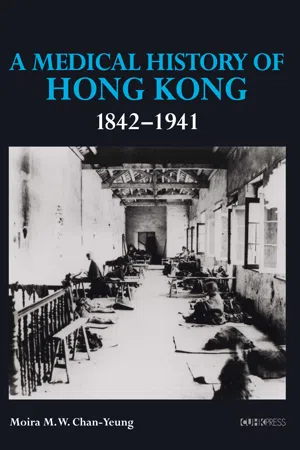
- English
- PDF
- Available on iOS & Android
A Medical History of Hong Kong: 1842–1941
About this book
This book tells the fascinating story of the development of medical and sanitation services in Hong Kong during the first century of British rule and how changing political values and directions of the colonial administration and the socio-economic status of the Hong Kong affected the policies of development in these areas. It also recounts how the bubonic plague of 1894 changed the government's laissez-faire attitude towards sanitation and public health and began sanitary reforms and developed public health infrastructure.~~~~~~~~~~~This book is not just a chronological history of the medical and health system of Hong Kong between 1842 and 1941. It also gives a critical and dispassionate analysis of the different cultural, social, and political factors which prompted the government and the public to consider change and implement reforms with far reaching effects. It also teaches us that racial discrimination, social inequity, and mutual distrust are always obstacles to social progress including healthcare.—Rosie T. T. Young, The University of Hong KongMany books have been written about the history of medicine and public health in colonial Hong Kong, but here at last we have a comprehensive survey that will appeal to general readers and scholars alike. Moira Chan-Yeung's tale of two cities contrasts the gradually improving sanitation and health standards enjoyed by Hong Kong'sprivileged European elite with the squalid conditions endured by the impoverished Chinese residents until the turning point of the bubonic plague epidemic in 1894. The story of rapid improvement in the lives of Hong Kong's ever-expanding population in the early twentieth century is explained within the social, political and cultural context that made Hong Kong so distinctive as a British colony.—Peter Cunich, The University of Hong KongBased on solid archival research, contextualized in the social, political, and cultural history of the period, physician-scientist-historian Moira Chan-Yeung has given us a fascinating, readable exploration of the evolution of Western medicine in Hong Kong, its diseases, institutions, colonial abuses, and scientific achievements. In this story, matters of gender, race, class, and autonomy repeatedly determined health or illness and influenced attempts to care.—Jacalyn Duffin, Queen's University
Frequently asked questions
- Essential is ideal for learners and professionals who enjoy exploring a wide range of subjects. Access the Essential Library with 800,000+ trusted titles and best-sellers across business, personal growth, and the humanities. Includes unlimited reading time and Standard Read Aloud voice.
- Complete: Perfect for advanced learners and researchers needing full, unrestricted access. Unlock 1.4M+ books across hundreds of subjects, including academic and specialized titles. The Complete Plan also includes advanced features like Premium Read Aloud and Research Assistant.
Please note we cannot support devices running on iOS 13 and Android 7 or earlier. Learn more about using the app.
Information
Table of contents
- Title Page
- Copyright
- Dedication
- Contents
- Foreword
- Preface
- Acknowledgements
- 1. The Reluctant Birth of Medical Services in Hong Kong
- 2. Diseases of Venus: Prostitution and Its Control
- 3. The Chinese Hospital (Tung Wah): Its Rise, Decline, and Rebirth
- 4. Western Medicine: A Hard Sell in Hong Kong
- 5. The Inconvenient Truths: Sanitation in Hong Kong
- 6. The “Great Dying”: Bubonic Plague
- 7. Plague: A Breeding Ground forImprovements in Public Health
- 8. Women’s Medicine: Maternal and Infant Health
- 9. The Three Great Killers: Malaria, Smallpox, and Beriberi
- 10. A Century of Development and Achievement
- Appendix 1
- Appendix 2
- Notes
- Glossary
- Bibliography
- Index